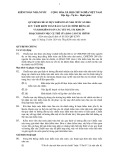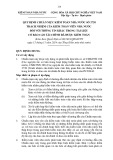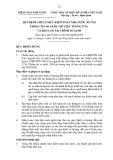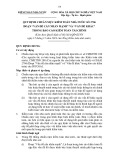
P-ISSN 1859-3585 E-ISSN 2615-9619 https://jst-haui.vn ECONOMICS - SOCIETY Vol. 60 - No. 11E (Nov 2024) HaUI Journal of Science and Technology
167
RESEARCH ON FACTORS AFFECTING THE QUALITY OF ACCOUNTING INFORMATION SYSTEMS AT PUBLIC HOSPITALS IN HANOI
Nguyen Thi Thanh Loan1,*, Tran Thi Minh Xuan2 DOI: http://doi.org/10.57001/huih5804.2024.355 ABSTRACT
The article studies the factors affecting the quality of accounting
information systems in public hospitals in Hanoi. The study surveyed 360
subjects, conducted
reliability testing of the scale, exploratory factor analysis
EFA and correlation analysis, and multivariate regression. The research results
show that information technology factors, organizational culture, employee
training and education, employee commit
ment to the organization, support
from senior management, and manager knowledge are factors affecting the
quality of accounting information systems. The article has proposed a number
of recommendations to help improve the quality of accounting information
systems for public hospitals in Hanoi. Keywords:
Accounting information system; Public hospital; Quality of
accounting information system. 1School of Economics, Hanoi University of Industry, Vietnam 2Hanoi Medical University, Vietnam *Email: nguyenthithanhloan@haui.edu.vn Received: 29/5/2024 Revised: 25/7/2024 Accepted: 28/11/2024 ABBREVIATIONS AIS Accounting Information System IT Information Technology 1. INTRODUCTION Autonomy is an inevitable trend and an important condition to promote the development of public service units. However, when implementing autonomy, hospitals need to ensure fairness in health care for everyone. The quality of medical examination and treatment must be improved, and patients need to have access to increasingly better medical services, with higher quality and reasonable prices. In addition to the task of social security policy, hospitals must also ensure spending on professional activities, especially spending on human resources, which requires hospitals to balance revenue and expenditure, ensuring management of the unit's revenue sources. Due to many years of dependence on funding from the State budget, all activities of public hospitals must comply with regulations on the use of the State budget, and there is no initiative in managing revenue and expenditure from service revenue sources. The organization of fee collection is not yet tight and flexible, the data on fee collection, costs of using materials, chemicals, drugs... for patients are mainly done manually, not automatically retrieved from the hospital management software to the accounting software. This has made the AIS at public hospitals less flexible, accounting information is mainly for reporting purposes. More specifically, the quality control of accounting information has not been focused on by hospitals. Hospital accounting only stops at controlling books and financial reports to ensure compliance with accounting regulations, checking the quantity and time provided by accounting subjects. Controlling the quality and reliability of information provided on reports has not been of concern to hospitals. In the context of operating under an autonomous mechanism, public hospitals need to quickly improve management tools to suit reality. The AIS is one of the important tools, providing complete and timely accounting information. The AIS not only supports decision making, planning, organization, leadership, operation and control but also plays a role in analyzing, forecasting and preventing risks. Many decisions are made based on information from the AIS, serving as the basis for effective and reasonable resource allocation, helping the organization achieve high efficiency.

ECONOMICS - SOCIETY https://jst-haui.vn HaUI Journal of Science and Technology Vol. 60 - No. 11E (Nov 2024)
168
P
-
ISSN 1859
-
3585
E
-
ISSN 2615
-
961
9
To meet the need for using accounting information in the context of comprehensive financial autonomy, public hospitals need to organize a high-quality AIS. This system must provide useful information so that managers can make effective and timely decisions. Traditional AIS are often accompanied by a large accounting team, where accounting work is performed manually through a system of vouchers, accounts, detailed and general accounting books, along with separate processes for each transaction. The 4.0 technology revolution has brought about significant changes in the operating environment, especially in technology, with the presence of modern hardware and software, updated and connected both internally and globally. In the IT environment, many traditional accounting functions have been merged and incorporated into new systems, requiring a combination of technological and accounting knowledge. The application of information technology in accounting has significantly improved the quality of accounting work as well as accounting information. Therefore, public service units in general and public hospitals in particular need to improve the quality of accounting information systems in the new context, ensuring the provision of high-quality accounting information [2, 3]. To achieve this, public hospitals need to identify factors affecting the quality of AIS. Therefore, the general objective of the study is to identify factors affecting the quality of AIS. From there, propose solutions to improve the quality of AIS at public hospitals in Hanoi. 2. LITERATURE REVIEW Studies on AIS are often based on different fundamenal theories, so the influencing factors are also mentioned differently in each study. According to contingency theory, there is no effective management style in all situations, so managers need to be flexible in the process of managing the business, the role of managers in finding and overcoming limitations will help the business achieve the set goals. Managers, users of information from the AIS, are closely related to this system. Accounting information from the AIS is created to meet the information needs of managers to support business decision making [5]; The perception of managers and business owners also affects the quality of the information system [8], in this study, factors related to business management will be mentioned including the support of senior managers and the knowledge of managers; Rapina [14] conducted a quantitative study by surveying accounting staff in 33 cooperatives in Bandung, Indonesia to determine the extent to which factors such as management commitment, organizational culture, and organizational structure affect the quality of AIS. The study also measured the impact of AIS, management support, organizational culture, and organizational structure on the quality of accounting information; Using a quantitative research method, Nurhayati determined that management commitment and managers' knowledge (including professional level of AIS through education, training, and experience) have a significant impact on the successful implementation of AIS. This study used the ANOVA tool in SPSS to test the hypothesis and determine the relationship; Indahwati [11] proposed two hypotheses: management commitment affects the quality of AIS and user authority affects the quality of AIS; Senior management commitment is an important factor to ensure the successful implementation of AIS, without this commitment, the implementation of information systems will fail [1, 13,15] found that top management commitment significantly affects the implementation of AIS. Top management plays an important role in setting goals and supporting changes in work habits, procedures and reorganization of AIS in the organization. Furthermore, Laudon and Laudon also argued that management commitment affects the implementation of AIS through the support of users and technical information service staff; Luong Duc Thuan [17] also emphasized that effective implementation of an information system requires commitment from top management; In Vietnam, Vu Thi Thanh Binh [4] argued that the effectiveness of the installation program depends on the level of commitment from top management, which determines the success of the application program. Support from senior managers can motivate employees to develop positive attitudes towards AIS, thereby improving the quality of the system; Many studies have shown the influence of management involvement on the design and effectiveness of information systems [6, 9]. These authors measured the effectiveness of the AIS based on five components of accounting information quality: completeness, accuracy, timeliness, clarity and ease of use. The management factor was assessed through aspects such as knowledge, participation and support of management or owners. The study used exploratory analysis and multiple regression with the support of SPSS 20 software, over 169 collected

P-ISSN 1859-3585 E-ISSN 2615-9619 https://jst-haui.vn ECONOMICS - SOCIETY Vol. 60 - No. 11E (Nov 2024) HaUI Journal of Science and Technology
169
survey forms. The results showed that all three aspects of the management factor affected the effectiveness of the AIS. This proves that the management factor is an important factor for the quality of the AIS and plays an important role in the implementation and development of the AIS in each enterprise. Therefore, future studies on the quality of the AIS should not ignore the influence of the management factor; Based on the contingency theory, Vu Thi Thanh Binh [4] built a model of factors affecting the quality of AIS in small and medium-sized enterprises in Hanoi. Through analyzing empirical evidence, the study showed that five factors in the model all affect the quality of AIS, including: (1) Business environment, (2) Enterprise structure, (3) Information technology, (4) Managerial participation in implementing accounting information systems, (5) Accounting team. Notably, IT factors and manager participation have the strongest influence on the quality of AIS. Specifically, IT has the greatest influence on the quality of information processing, while manager participation has the strongest impact on the quality of accounting information. According to the information processing theory, Ismail and Malcom [12] used this theory in their study of the quality of AIS in 214 small and medium-sized manufacturing enterprises in Malaysia. The study used cluster analysis to differentiate the enterprises into two groups: the group with high responsiveness and the group with low responsiveness. Then, the hypotheses were tested by comparing these two groups according to each influencing factor. The proposed factors include: the complexity of AIS, management knowledge, management commitment, internal experts, external experts and enterprise size. The results of the study showed that factors such as the complexity of AIS, management knowledge of accounting and information technology, the use of experts from associations and accounting firms, and the presence of an information technology team, all affected the level of AIS's responsiveness; Sacer and Oluic [16] study on the impact of IT infrastructure on the quality of information systems in medium and large enterprises in Croatia showed that an appropriate IT infrastructure can bring many benefits, including cost reduction, information quality improvement, and productivity enhancement; Similarly, Taber et al. found a significant relationship between IT infrastructure (including software, hardware, database) and the effectiveness of AIS in private educational institutions in Jordan. Indahwati [11] also pointed out that IT infrastructure affects the quality of AIS. Nowadays, the application of IT in AIS has become widespread, therefore, choosing the appropriate IT infrastructure is a decisive factor for the effectiveness of AIS. Developing and improving IT infrastructure is a top priority in overall IT management; Fardinal asserted that the suitability of the components related to the AIS is very important to develop a strong internal control system (ICS) in an organization; A strong ICS is essential, especially in a technological environment, to minimize the risks associated with the AIS [16]; In a study on the impact of information technology on the quality of AIS, Meiryani [13] examined the impact of IT use in state-owned enterprises in Indonesia. Using a questionnaire survey method and data analysis through SEM PLS structural model, the results showed that the IT factor has a very small impact (0.84%) on the quality of AIS. The reason may be that the equipment and use of IT in AIS in these organizations is not effective, leading to the quality of AIS not being significantly improved. This result shows that IT is only one of many factors affecting the quality of AIS. To improve the quality of AIS, it is necessary to identify and evaluate which factors have the most significant impact and include them in the research model, from which appropriate measures can be proposed; In a study on the relationship between the level of IT equipment and the quality of AIS in enterprises of different sizes, Vu Thi Thanh Binh [4] found that large-scale enterprises have a better level of IT equipment, including systems and technology applications for accounting work, than small and medium-sized enterprises. From there, the author concludes that the quality of AIS in large-scale enterprises is often higher than that in small and medium-sized enterprises; In the context of applying information technology in enterprises, Vu Quoc Thong and Tran Thi Tuong Vi [20] used both qualitative and quantitative research methods to identify factors affecting the quality of AIS in enterprises in An Giang province. The authors collected 220 survey questionnaires and 199 were valid. The research results showed that there are six factors affecting the quality of AIS in an information technology environment: (1) data quality, (2) accounting staff qualifications, (3) IT infrastructure, (4) managers' accounting knowledge, and (5) internal control system. Another approach is to use multiple theories, as in the study by Sabherwal et al. [15], the authors conducted a complex study to assess the quality of information systems and their influencing factors. This study

ECONOMICS - SOCIETY https://jst-haui.vn HaUI Journal of Science and Technology Vol. 60 - No. 11E (Nov 2024)
170
P
-
ISSN 1859
-
3585
E
-
ISSN 2615
-
961
9
integrated many foundational theories, including Delone & McLean's model of information systems success (D&M), technology acceptance theory (TAM), theory of reasoned action (TRA), and acceptance and use of technology (UTAUT) model, to construct independent and dependent variables in the research model. The results of the study showed that many hypotheses were confirmed. However, some hypotheses about the interactions between the components measuring the quality of AIS were rejected. In particular, the study discovered a number of new relationships that were not mentioned in the initial hypotheses, including: experience positively affects user participation, user attitudes significantly positively affect system quality, and system quality positively affects system usage; Luong Duc Thuan [17] in his study evaluating factors affecting the quality of AIS in Vietnam relied on many different theoretical perspectives to determine the attributes of quality of AIS. The author identified the influencing factors as user participation, external experts, and organizational structure. Using a combination of qualitative and quantitative research methods, the author tested the hypothesis by multiple linear regression analysis and found that only user participation and organizational structure affected the quality of AIS, with almost the same level of impact. However, this study has limitations in that it was only conducted in Ho Chi Minh City, was conducted in a short period of time, and had a small sample size. Further studies are needed to find other influencing factors to test the relationship with the quality of AIS in the Vietnamese market; Nguyen Thi Thuan [18] applied various theories, including information processing theory and diffusion of innovation theory to study the quality of AIS. The research results showed that factors such as employee training and education, information technology, corporate culture, employee commitment, senior management support, and manager knowledge all have a positive impact on the quality of AIS. These factors play an important role in improving the performance of traffic construction enterprises in Vietnam. 3. METHODOLOGY 3.1. Theoretical basis In this study, the author uses foundational theories such as contingency theory, information processing theory, managerial behavior theory and innovation diffusion theory to identify factors affecting the quality of AIS of public hospitals in Hanoi. Contingency theory is considered to be relevant in the field of management research. When applied to the study of AIS, this theory suggests that in order to meet the requirements of enterprises, there needs to be a reasonable adjustment between environmental factors and enterprise structure. Many studies based on contingency theory have identified factors affecting the quality of AIS. These studies have shown that both factors belonging to the enterprise and the business environment have a significant impact on the quality of AIS. From this, it can be seen that AIS need to be designed to be flexible and adaptable to changes in the surrounding environment. In the context of public service units and public hospitals transitioning to a fully autonomous mechanism, adjusting AIS to suit is essential. Furthermore, with the development of the 4.0 industrial revolution, public service units need to quickly adapt to new technologies. Contingency theory provides an important foundation for studying factors affecting the AIS. Information processing theory. In mid-1973, information processing theory was first introduced by Galbraith. This theory refers to the requirements and capabilities of information processing, as well as the compatibility between these two factors to achieve optimal efficiency for the enterprise. Organizations need to regulate information to cope with environmental uncertainty, thereby improving the decision-making process. Nguyen Thi Thuan (2021), based on information processing theory, pointed out that IT is a factor affecting the quality of AIS in traffic construction enterprises. The author emphasized that IT plays an important role in data processing and information provision in AIS. In the context of the 4.0 industrial revolution, public hospitals are also gradually applying IT to their operations. Therefore, this study also uses information processing theory to select factors affecting the quality of AIS at public hospitals in Hanoi. Management behavior theory. Simon introduced the Managerial Behavior Theory, emphasizing that the core issue in management is making appropriate decisions. The Managerial Behavior Theory mainly focuses on changing managers' behavior to make important decisions that are appropriate to actual conditions. In the study of Nguyen Thi Thuan [18], this theory was applied to select factors such as employee commitment to the enterprise, support from senior management, and manager knowledge as factors affecting the quality of AIS. For public service units,

P-ISSN 1859-3585 E-ISSN 2615-9619 https://jst-haui.vn ECONOMICS - SOCIETY Vol. 60 - No. 11E (Nov 2024) HaUI Journal of Science and Technology
171
especially public hospitals in the process of autonomy, the role of managers becomes increasingly important. Public service units constantly improve their operations to enhance competitiveness and operational efficiency. Therefore, behavioral management theory is an important fundamental theory in studying factors affecting the quality of AIS in public hospitals. Innovation diffusion theory. According to Rogers, there are three main factors that influence the ability of an organization to accept innovation, such as implementing BSC: (1) Personal characteristics of managers: Managers play an important role in committing and supporting the organization to adopt innovation; (2) Organizational characteristics: The structure and culture of the organization greatly influence the dissemination and implementation of new ideas. An organization with good connection, sharing and communication between departments will find it easier to accept innovation; (3) External characteristics of the organization: In addition to internal factors, external factors such as a highly competitive environment can also promote the organization to accept and apply new initiatives. Applying this theory, the author studies the factors affecting the quality of the AIS in public service units, focusing especially on the personal characteristics of managers [18]. Technology Acceptance Model. The quality of AIS is assessed through users' perceptions of output information, and is also measured by the extent to which it meets users' needs in providing information necessary for the decision-making process. Therefore, the quality of AIS is often expressed through perceptions of ease of use and usefulness of the system. According to the Technology Acceptance Model (TAM) proposed by Davis, factors such as perceptions of ease of use and usefulness of technology influence attitudes toward using technology, which in turn leads to actual adoption of technology. The TAM model is based on the Theory of Reasoned Action (TRA) and the Theory of Planned Behavior (TPB) developed by Ajzen. The author applies the Technology Acceptance Model (TAM) to identify factors affecting the quality of AIS in public hospitals in Hanoi. When economic units perceive the usefulness and ease of use of the current AIS, it will influence their intention and behavior to use the system. 3.2. Research model and research hypothesis Based on the research overview and foundational theories such as contingency theory, information processing theory, management behavior theory, innovation diffusion theory, technology acceptance model, 6 factors were selected for research: (1) information technology, (2) employee training and education, (3) organizational culture, (4) employee commitment to the organization, (5) support from senior management, (6) knowledge of managers". To analyze the factors affecting the quality of AIS and find solutions to improve the quality of AIS in public hospitals in Hanoi, the group of authors developed a research model (Figure 1) based on the inheritance from the research of Nguyen Thi Thuan [18]. Figure 1. Factors affecting the quality of AIS in public hospitals in Hanoi (1) Information Technology Dehghanzade et al. divided IT into two main categories: hardware and software. Software is the set of operations that instruct hardware to perform specific tasks. Xu states that software includes all the processes for collecting information. According to Romney and Steinbart, IT includes computers and other electronic devices used to store, retrieve, transmit, and manipulate data. Meanwhile, Keen defines IT as any form of technology used to create, store, exchange, and use information in various forms. Applegate et al. divide IT into three main components: network-related technology, transaction processing technology, and IT-related infrastructure. Raymond and Paré assessed the level of sophistication of IT in management information systems based on the nature, complexity and interaction between the use and management of IT in the enterprise. According to them, this level of sophistication includes both the use and management of IT. Ismail and Malcolm [12] applied in the context of the AIS of small and medium enterprises and found that due to limited resources, small and medium enterprises are often less capable of managing IT, therefore, the sophistication of IT in these enterprises is only considered from the perspective of IT


























